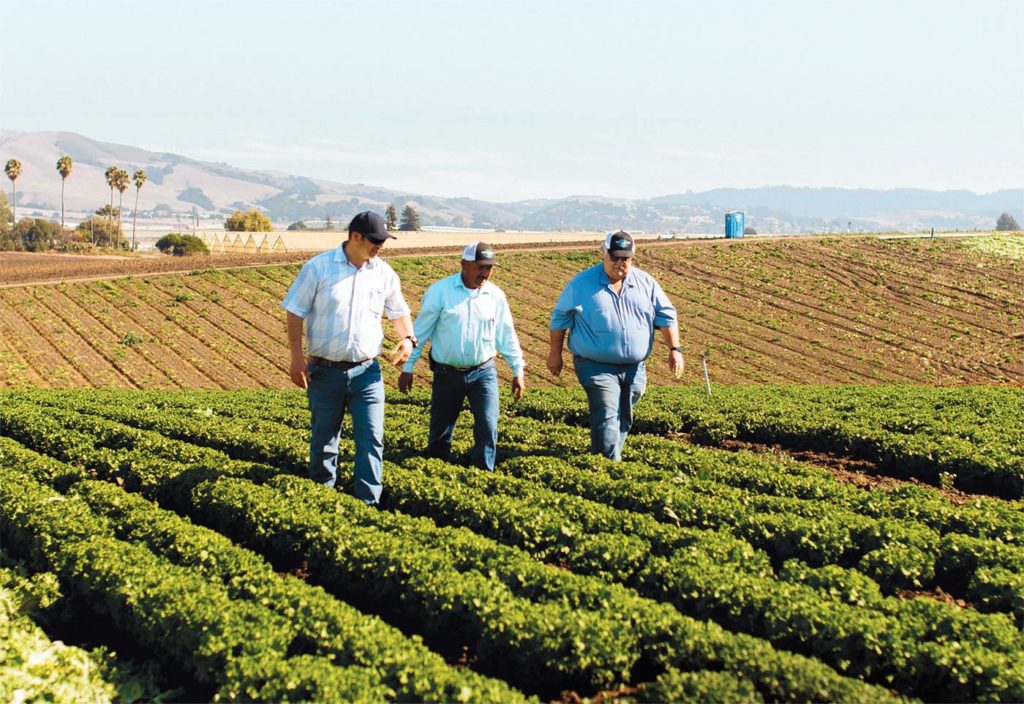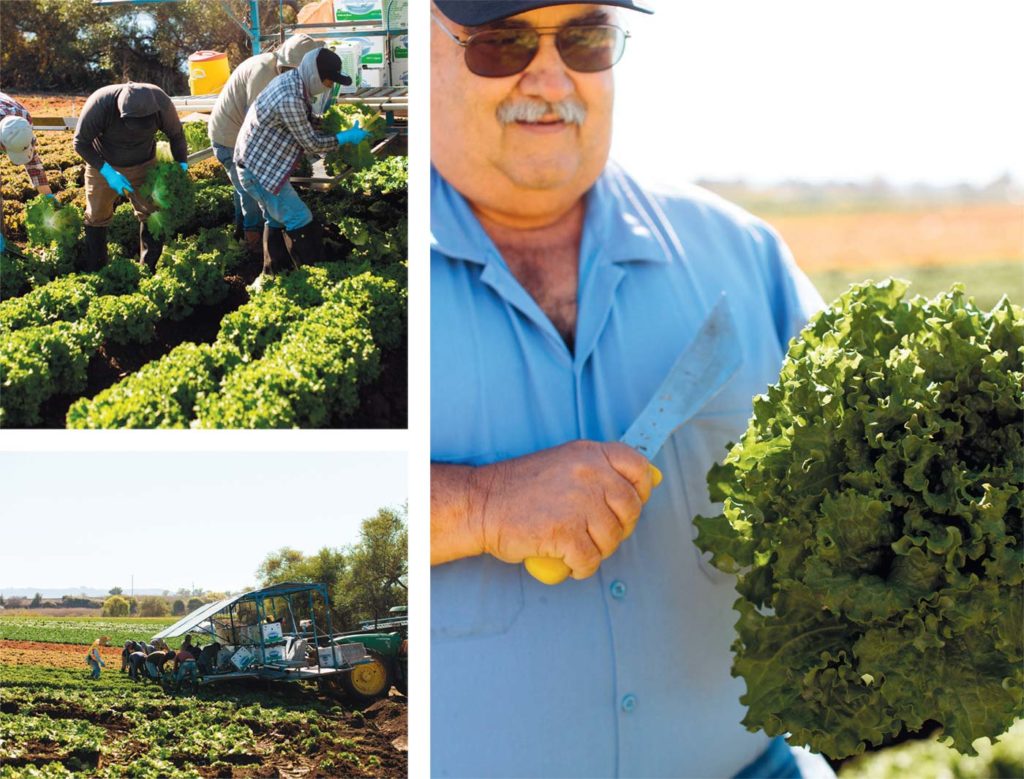PHOTOGRAPHY BY GENEVA RICO

Watsonville’s Lakeside Organic Gardens celebrates 25 delicious years
Dick Peixoto had already dedicated himself to farming the conventional way when he became intrigued by organic. His motivation at the time was more about making a smart business move than saving the earth.
Peixoto, founder of Lakeside Organic Gardens in Watsonville, recalls that in the beginning, it was only “crazy hippie farmers” who were growing and selling organic produce. “But I went to the farmers’ markets and got to know a couple of them, and they were making money,” he says with a laugh. And that was enough to set him down a path that would lead to creating the largest family-owned and operated solely organic vegetable grower-shipper in the United States.
On a recent afternoon, Peixoto climbs into his mud-splattered pickup truck and tours the fields next to Lakeside headquarters, waving to workers as he inspects celery that’s being grown for Thanksgiving, as well as several varieties of kale, collards and other crops due for harvest in late autumn.
Lakeside employs around 350 employees, “some of which have been with us since the company started,” says Peixoto, which includes a handful of his family members. “Everyone’s important, they’re all part of the chain that makes it all work.”
Lakeside is now celebrating a quarter-century in business, fostered by innovations and creative thinking that have allowed it to scale up and become a produce powerhouse. “It’s good for the community and it’s good for the Pajaro Valley,” Peixoto says, both of the business he’s carefully nurtured as well as his advocating for organic agriculture, noting that “millions of tons” of potentially harmful pesticides and other chemicals have been kept from the valley’s fertile soil over the last 25 years. “I have a lot of pride in that.”
In the early 20th century, Peixoto’s grandfather immigrated to California from the Azores (Portuguese islands in the Atlantic Ocean) and made his living growing potatoes. Peixoto’s father took a different career path—as an agricultural pesticide salesman. It’s a small bit of irony now that Dick Peixoto spent much of his youth riding around with his dad on pesticide sales calls.
On their 15-acre farm, his family grew a little bit of everything for their own use, and while still in high school, Peixoto leased 40 acres and started growing produce. “I bought my first tractor at age 16…I didn’t even know how to start it,” he recalls. His high school ag teacher helped him out, and before long Peixoto was supplying iceberg lettuce to Dole and pickling cucumbers to Del Monte.
After graduating from Watsonville High School in 1975, Peixoto continued to farm conventionally until the early 1990s, when organic began to intrigue him. It takes three years to convert conventional farmland to organic, and eventually 1,000 acres in the Pajaro Valley were transformed under Peixoto’s direction. When some of his farming friends teased him about his “garden,” Peixoto in 1996 turned the jibe into his new company’s name, Lakeside Organic Gardens.
Figuring out how to grow crops with organic fertilizers and beneficial insects wasn’t that hard, Peixoto says. The real challenge was selling organic. Peixoto couldn’t get into the farmers’ markets—well-established local organic farmers already had their spaces staked out—so he began forming alliances with natural foods grocery stores like Staff of Life and New Leaf.
There’s the story that Peixoto simply walked into Staff of Life one day, carrying a box of produce that he had grown, and the produce manager bought it right then and there. To this day, the relationship between Lakeside and Staff of Life is a close one, and the company “is still a big supplier of our produce,” says Staff of Life co-founder Gary Bascou. Peggy Bascou, Gary’s wife, says Peixoto told her the story of that first encounter, and praised him for the extra support that was needed to open the new Staff of Life store in Watsonville this past March.
Millions of tons of potentially harmful pesticides and other chemicals have been kept from the valley’s fertile soil over the last 25 years.

Over the years, Lakeside continued to add to the stores it was supplying and enlarging its acreage, ending up with its current 2,500 acres in the Pajaro Valley and another 1,200 in the Imperial Valley, which was added to ensure a reliable year-round supply of produce. Peixoto also found profit was leaking away in shipping charges, so Lakeside started its own packing and shipping department.
Four years ago, the company built a new cooler, a 50,000-square-foot warehouse with the capacity to make 100 tons of ice a day, and provide seven different cooling methods that are used for the various kinds of produce—important because Lakeside grows some 50 different crops.
Peixoto took his organic advocacy in a delicious direction when he purchased the California Grill seven years ago. The Watsonville restaurant showcases Lakeside produce on its menus, and highlights a cornucopia of other local products, including Martinelli’s cider, Gizdich Ranch pies, meats from Freedom Meat Lockers and Corralitos Market, seafood from Stagnaro Bros. and freshly made bread from Golden Sheaf.
He’s also proud of the company’s legacy in protecting the Pajaro Valley from conventional pesticides. One way in which that’s being done is through partnering with other agricultural companies to create buffer zones around schools, with Lakeside farming closer to the schools to protect children from harmful effects of pesticide drift. He also created an agricultural land trust to ensure that the acreage near Lakeside headquarters will always remain farmland.
During the past 25 years, Peixoto says one of the biggest shifts he’s seen is simply in respect for what organic farmers do. “When I started, organic was seen as hobby farming,” he says. Now, there’s a general respect for organic farming and an acknowledgement that organic produce should be offered whenever possible. “Everyone,” says Peixoto, “should have a choice.”
LAKESIDE ORGANIC GARDENS
lakesideorganic.com
CALIFORNIA GRILL
40 Penny Lane, Watsonville
831.722-8052
californiagrillrestaurant.com
About the author
Kathryn McKenzie, who grew up in Santa Cruz and now lives on a Christmas tree farm in north Monterey County, writes about the environment, sustainable living and health for numerous publications and websites. She is the co-author of “Humbled: How California’s Monterey Bay Escaped Industrial Ruin.”
- Kathryn McKenziehttps://www.ediblemontereybay.com/author/kamckenzie/
- Kathryn McKenziehttps://www.ediblemontereybay.com/author/kamckenzie/
- Kathryn McKenziehttps://www.ediblemontereybay.com/author/kamckenzie/
- Kathryn McKenziehttps://www.ediblemontereybay.com/author/kamckenzie/



